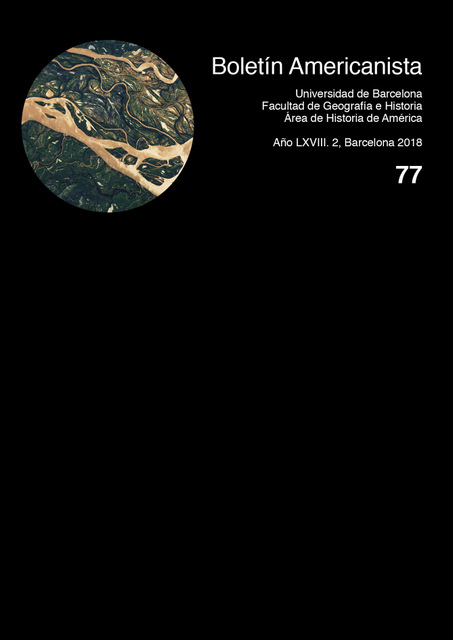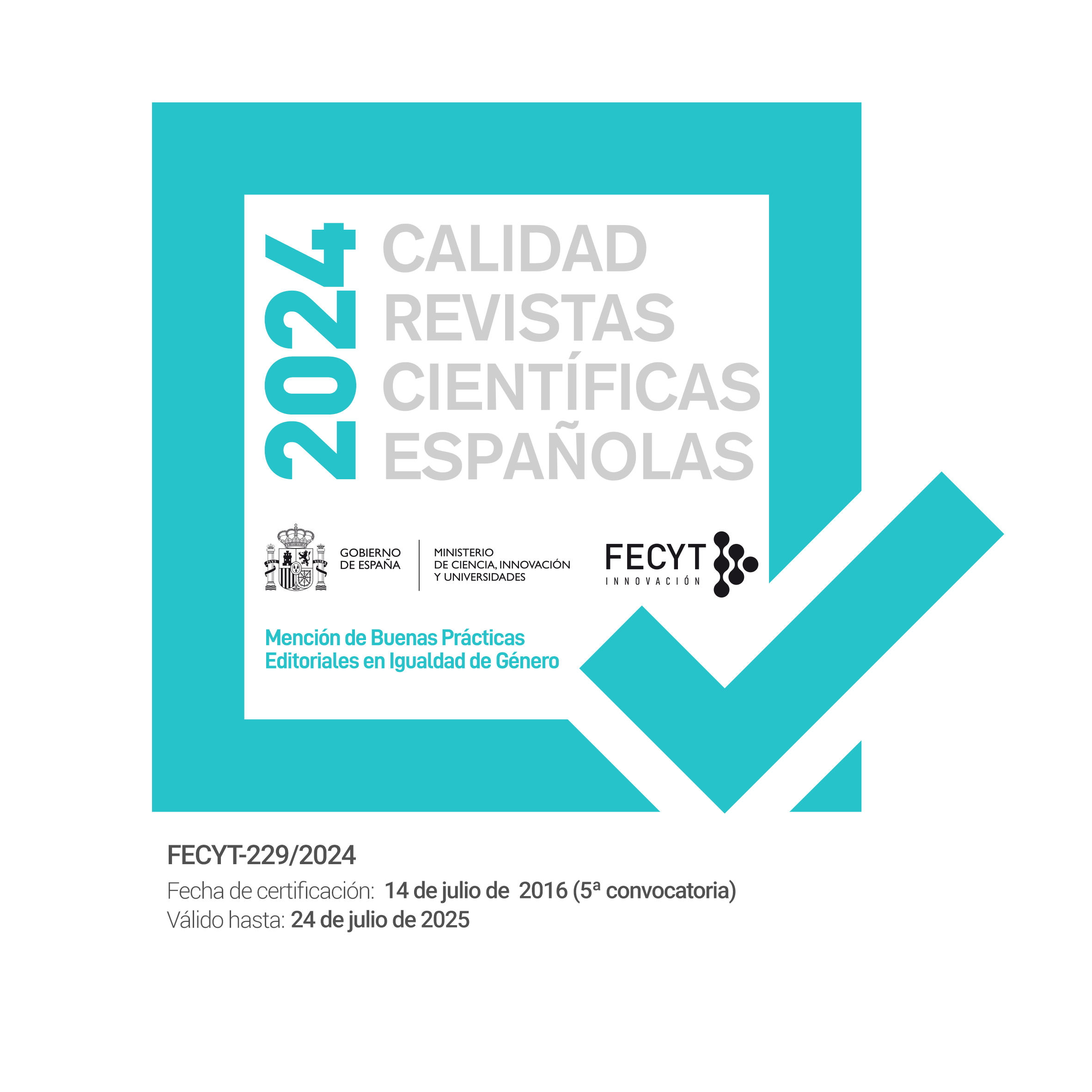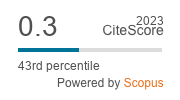Andrés Pérez de Ribas o del conocimiento lingüístico en el trabajo misional de Nueva España durante el siglo XVII
Resumen
La presente contribución discute el uso del conocimiento lingüístico con fines coloniales en el noroeste de la Nueva España durante el siglo xvii. Describe inicialmente el interés lingüístico contemporáneo en Europa para narrar posteriormente la dimensión pragmática adoptada por la lingüística en el Nuevo Mundo, con la idea de hacer frente al reto del contacto y la evangelización de los naturales. Se analizan así los comentarios de un misionero jesuita, Andrés Pérez de Ribas (1575-1665), quien en su relación de 1645 expresa como pocos la utilidad del conocimiento lingüístico para la labor evangélica
Citas
Alegre, Francisco Javier (1842). Historia de la Compañía de Jesús en Nueva España que estaba escribiendo el P. Francisco Javier Alegre al tiempo de su expulsión, Tomo II. México: Impreso por José María Lara.
Andrews, Edward Wyllys y Oster Mozillo, Elizabeth (eds.) (1994). Five Hundred Years after Columbus: Proceedings of the 47th International Congress of Americanist. Nueva Orleans: Tulane University Press.
Bannon, John Francis (1991). «The Mission Frontier in Sonora, 1620-1687». En: Polzer, Charles W. (ed.). The Jesuits missions of northern Mexico. (Spanish Borderland Sourcebooks, vol. 19). Nueva York: Garland, págs. 35-201.
Barnes, Thomas Charles; Naylor, Thomas H. y Polzer, Charles W. (1981). Northern New Spain. A Research Guide. Tucson: University of Arizona Press.
Brading, David A. (1991). The First America. The Spanish Monarchy. Creole patriots, and the Liberal State, 1492-1867. Cambridge: Cambridge University Press.
Breva-Claramonte, Manuel (2007). «The European Linguistic Tradition and Early Missionary Grammars in Central and South America». En: Kibb ee, Douglas A. (ed.). History of Linguistics 2005. Ámsterdam: John Benjamins, págs. 236-251.
Burrus, Ernest J. y Zubillaga, Félix (1956). Historia de la Provincia de la Compañía de Jesús de Nueva España, 4 vols. Roma: Institutum Historicum.
Carhart, Michael C. (2007). The Science of Culture in Enlightenment Germany. Harvard: Harvard University Press.
Cassani, Joseph (1734). Glorias del segundo siglo de la Compañía de Jesús: dibuxadas en las vidas de algunos de sus varonesilustres que han florecido desde el año de 1640. Madrid: Manuel Fernández.
Chelliah, Shobhana L. y Reuse, William J. de (2011). Handbook of Descriptive Linguistic Fieldwork. Heidelberg: Springer.
Clauss, Sidonie (1982). «John Wilkins’ Essay toward a Real Character: its place in the Seventeenth- Century Episteme». En: Subb iondo, Joseph L. (ed.). John Wilkins and the 17th-Century British Linguistics. Ámsterdam: John Benjamins, págs. 45-67.
Clossey, Luke (2008). Salvation and globalization in the early Jesuits missions. Cambridge: Cambridge University Press.
Cooper-Romp ato, Christine F. (2010). The gift of tongues. Women’s xenoglossia in the Later Middle Ages. Pensilvania: University of Pennsylvania Press.
Coseriu, Eugenio y Meisterfeld, Reinhard (2003). Geschichte der romanischen Sprachwissenschaft. Tubinga: Gunter Narr, tomo 1.
Crossley, Pamela Kyle (2008). What is Global History. Cambridge: Polity Press.
Del Río, Ignacio (1982). «Repartimiento de indios en Sonora y Sinaloa». En: Memoria del VII Simposio de Historia de Sonora. Hermosillo: Universidad de Sonora, págs. 161-178.
Del Río, Ignacio (2003). El régimen jesuítico de la Antigua California. Ciudad de México: UNAM.
Dozier, Edward P. (1959). «Two Examples of Linguistic Acculturation. The Yaqui of Sonora and Arizona and the Tewa of New Mexico». Language, Washington, vol. 32, núm. 1, págs. 146-157.
Dunne, Peter Masten (1951). Andrés Pérez de Ribas: pioneer Black Robe of the West Coast, Administrator, Historian. Nueva York: United States Catholic Historical Society.
Estrada Fernández, Zarina y Grageda Bustamante, Aarón (2010). «Colonización y política del lenguaje: el norte de México». En: Barriga, Rebeca y Butragueño, Pedro Martín (eds.). Historia sociolingüística de México. México: El Colegio de México, vol. 1, págs. 545-603.
Fernández de Oviedo, Gonzalo (1535). General y natural historia de las Indias. Sevilla: Juan Cromberger.
Gerhard, Peter (1982). The North Frontier of New Spain. Princeton: Princeton University Press.
Grageda Bustamante, Aarón (2013). «Los cronistas oficiales de Indias y la integración del Nuevo Mundo en la historia general de España en el siglo xvi. Aportes para la discusión global contemporánea». En: Grageda, Aarón (coord.). Intercambios, actores, enfoques: pasajes de la historia latinoamericana desde una perspectiva global. Hermosillo: Universidad de Sonora, págs. 29-46.
Guice, Stephen A. (1987). «Early New England Missionary Linguistics». En: Aarsleff , Hans-Joseph y Kelley, Louis G. (eds.). Papers in the History of Linguistics: Proceedings of the Third International. Ámsterdam: John Benjamins, págs. 223-232.
Guzmán, Ignacio (1992). «La verdadera historia de la conquista del noroeste». En: Pérez de Ribas, Andrés. Historia de los triunfos de nuestra santa fee (edición facsimilar). Ciudad de México: Siglo XXI , págs. I-XIX.
Guzm án, Ignacio; Máynez, Pilar y Hernández, Ascensión (eds.) (2004). De historiografía lingüística a historia de las lenguas. Ciudad de México: Siglo XXI.
Herrera y Tordesillas, Antonio de (1601). Historia general de los hechos de los castellanos en las Islas y Tierra Firme del mar océano en cuatro décadas [...]. Madrid: Imprenta Real.
Hassler, Gerda y Neis, Cordula (2009). Lexikon sprachtheoretischer Grundbegriffe des 17. und 18. Jahrhunderts. Berlín: Walter de Gruyter, tomo 1.
Hu-Dehart, Evelyn (1981). Missionaries, Miners and Indians. Spanish Contact with the Yaqui Nation of Northwestern New Spain, 1533-1820. Tucson: University of Arizona Press.
Klöter, Henning (2010). The Language of the Sangleys. Chinese Vernacular in Missionary Sources of the Seventeenth Century. Leiden: Koninklijke Brill.
Lifschitz, Avi (2012). Language and enlightenment: The Berlin debates of the Eighteenth Century. Oxford: Oxford Universty Press.
Maat, Jaap (2010). «The Artes sermocinales in times of adversity. How grammar, logics and rhetorics suvived the Seventeenth Century». En: Bod, Rens; Maat, Jaap y Westseijn, Thijs (eds.). The making of the Humanities. Early Modern Europe. La Haya: Amsterdam University Press, págs. 283-297.
Markie, Peter (2015). «Rationalism vs. Empiricism». En: Zalta, Edward N. (ed.). The Stanford Encyclopedia of Philosophy. Stanford: Stanford University Press, págs. 345- 346.
Mazlish, Bruce (2006). The New Global History. Nueva York: Routledge.
Mungello, David E. (2012). «Christianity-Related Movements». En: Anheier, Helmut K. y Jürgensmeyer, Mark (coords.). Encyclopedia of Global Studies. Los Ángeles: Sage, vol. 1, págs. 174-175.
Navarro, Luis (1967). Sonora y Sinaloa en el siglo xvii. Sevilla: Escuela de Estudios Hispano- Americanos.
Ortega Noriega, Sergio (1985). «El sistema de misiones jesuíticas: 1591-1699». En: Ortega Noriega, Sergio y Del Río, Ignacio (eds.). Historia General de Sonora, vol. 2. Ciudad de México: Gobierno del Estado de Sonora, págs. 169-180.
Ostler, Nicolas (2004). «The Social Roots of Missionary Linguistics». En: Zwartjes, Otto y Hoydhaugen, Even (eds.). Missionary Linguistics / Lingüística Misionera. Ámsterdam: John Benjamins, págs. 34-46.
Osterhamm el, Jürgen y Petersson, Niels P. (2005). Globalization: A Short History. Princeton: Princeton University Press.
Palmer, Jessica Dawn (2008). The Dakota peoples: a history of the Dakota, Lakota and Nakota through 1863. Jefferson: McFaland.
Pérez de Ribas, Andrés (1645). Historia de los triumphos de nuestra santa fee entre gentes las mas barbaras, y fieras del nuevo orbe: conseguido por los soldados de la milicia de la Compañía de Jesús en las Missiones de la Provincia de Nueva España. Madrid: Alonso de Paredes.
Reff , Daniel T. (1999). «Critical Introduction. The “Historia” and Jesuit Discourse». En: Pérez de Ribas, Andrés (ed.); Reff , Ahern Maureen y Danforth, Richard (trads.). History of the Triumph of our Holy Faith Amongst the Most Barbarous and Fierce Peoples of the New World. Tucson: University of Arizona Press, págs. 11-46.
Reff , Daniel T. (2005). Plagues, Priest, and Deamons: Sacred narratives and the Rise of Christianity in the Old World and the New. Cambridge: Cambridge University Press.
Robins, Robert Henry (ed.) (2013). A short History of Linguistics. Nueva York: Routledge.
Rodríguez Tomp , Rosa Elba y Altable, Francisco (2002). «De la caza y la recolección a la explotación colonial de los recursos naturales». En: Trejo Barajas, Dení y González Gruz, Edith (eds.). Historia General de Baja California Sur. México: Plaza y Valdés, tomo 1, págs. 21-165.
Rozat, Guy (1995). América, imperio del demonio: cuentos y recuentos. Ciudad de México: Universidad Iberoamericana.
Salmon, Vivian (2009). «Effort and Achievement in Seventeenth-Century British Linguistics». En: Bynon, Theodora y Palmer, F. (eds.). Studies in the History of Western Linguistics (in Honor of R.H. Robins). Cambridge: Cambridge University Press, págs. 69-94.
Simone, Raffaele (1998). «The Early Modern Period». En: Lepschy, Giulio (ed.). History of Linguistics. Nueva York: Routledge, vol. 3, págs. 149-215.
Spicer, Eduard H. (1963). Cycles of Conquest. The Impact of Spain, Mexico and the United States on the Indian of the Southwest, 1533-1960. Tucson: University of Arizona Press.
Tavoni, Mirko (1998). «Western Europe». En: Lepschy, Giulio (ed.). History of Linguistics. Nueva York: Routledge, vol. 3, págs. 2-106.
Trueba, Alfonso (1961). Cabalgata heroica: misioneros jesuitas en el noroeste. Ciudad de México: Jus.
Vermeulen, Han F. (2015). Before Boas: The Genesis of Ethnography and Ethnology in the German Enlightenment. Lincoln y Londres: University of Nebraska Press.
Zubillaga, Félix (1974). Las lenguas indígenas de Nueva España en la actividad jesuita del siglo xvi. Caracas: Universidad Católica Andrés Bello.
Descargas
Publicado
Número
Sección
Licencia
El/la autor/a que publica en esta revista está de acuerdo con los términos siguientes.
a. El/la autor/a conserva los derechos de autoría y otorga a la revista el derecho de primera publicación de la obra.
b. Los textos se difundirán con la licencia Creative Commons de Atribución-NoComercial-SinDerivadas, que permite compartir la obra con terceros, siempre que éstos reconozcan su autoría, su publicación inicial en esta revista, las condiciones de la licencia. No se permite hacer un uso comercial de la obra ni distribuir obras derivadas sin el permiso explícito del titular de los derechos de autor.





